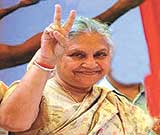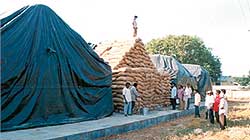If the Government wishes to put its will together and act, then there is very little that will not get done. We talk about showing us some political will, and the Delhi Government led by its Chief Minister Sheila Dikshit is doing just that. It is now taking the faulty PDS system head on, and trying to ensure that the poor, the poorest, and those who live marginally above the poverty line are not denied their ration at ration shops.
In fact, in November 2007, CM Dikshit publicly stated that the non-poor did not buy foodgrain from fair price shops and the grain allotted to these shops for them is usually diverted to other destinations. She also proposed that the households in the APL category be reassessed, and those not fitting in, taken out. Clearly, the will is being shown, and the way is being found by the administration.
 |
 |
The non-poor do not buy foodgrain from fair price shops. The grain allotted to these shops for them is usually diverted to other destinations
—Sheila Dikshit, Chief Minister, Delhi |
We’ll leave no stone unturned to ensure that the common man does not go without proper ration
—Haroon Yusuf, Minister of Food and Supplies, Delhi |
If we look back, since World War II, the public distribution system in the country has undergone major changes. Now, all around, including the National Capital Territory of Delhi it has turned into a social safety-net programme to ensure food security for all. Under the
PDS, the Central Government procures and supplies specified essential commodities to the Delhi Government at fixed prices. The essential commodities that may be sold through the PDS are specified by gazette notifications from time to time. In the past, a number of items like iodized salt, palm oil, candles, ghee and control cloth have been distributed through the
PDS. At present, however, PDS in Delhi is confined to two cereals, wheat and rice, and two other essential commodities—sugar and kerosene oil. In Delhi, PDS comprises a network of fair price shops and kerosene oil depots for making available specified articles at controlled prices through household consumer cards, commonly called ration cards.
There are several schemes through with the Government of Delhi reaches the poor and needy (see chart for details). As per a Government of India scheme, the Delhi Government has decided to provide foodgrain at BPL (below poverty line) rates for destitute people living in such welfare institutions as beggar homes, hostels for SC / ST and OBC students, home for street children, neglected and delinquent and abandoned children, juveniles, older persons, women’s homes. Priests, maulvis and imams with income less than Rs 24,200 are also being covered under
BPL.
Under the Antyodaya Anna Yojana scheme, the poorest of poor who are at the starving threshold are being provided food grains. Over 57,000 persons/families have been identified under this scheme.
The Annapurna Scheme envisages supply of food grain to people who are more than 65 years of age and not receiving any kind of old age pension from the Delhi Government.


The Delhi Government has figured that the issue of ration from ration shops is laden with corruption. People face several types of problems. The shops do not open. Even if they open, the usual plea of the shopkeeper is that there is no stock. Even if the stock is there, the ration provided is so adulterated that it is unfit for consumption. Ration issued to a person is less than the entitled quota of that person. The rates charged are much more than the official prescribed rates. In nutshell, a shopkeeper tries his best to prevent people from taking ration from him, so that he is left with as much ration as possible to sell in the black market.
Corruption takes place in records. The ration is siphoned off by making false entries in the records. Fake thumb impressions or signatures are put by the shopkeepers in the names of the people and their rations are siphoned off.
The Government of Delhi has taken up a major campaign for renewal of APL cards and weeded out around 1.5 million duplicate / bogus ration cards. Computerisation of data has also been introduced for keeping a database, which will be retained for five years.
As Uday Sahay, Director (IP), Delhi Government, puts it, “The Government’s seriousness in putting PDS back on the rails is matched by its action on the ground.” And actions are all that matter really.
|